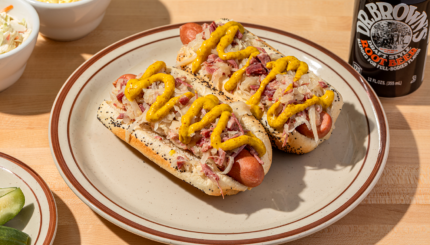I assumed it was an internet hoax at first. Driving my 13-year-old son back from his basketball game, an alert popped up on his phone saying that Kobe Bryant had died in a helicopter crash.
Over the course of the next few hours, my initial doubt transformed into crushing grief. First upon confirmation that Kobe was indeed dead, then upon hearing that his 13-year-old daughter, Gianna, was with him, and finally upon learning that nine people in total had perished.
Now, a week later, I find myself asking why I fell into such throes of grief. Not bummed out or nostalgic like I have felt when other athletic heroes have died, but quite literally in a state of aveilut (mourning), for someone I never met! Why did I stumble about like an onen (mourner during the initial period of loss) last Sunday night, cycling through pain and tears, paralyzed from engaging in ordinary life? Why was I so fixated on reading and listening to hespeds (eulogies or loving tributes) like this by those who knew Kobe well? Why did I remain home-bound, un-shaven and unable to do much more than sit and be comforted by my family as if I were sitting shiva? Why did I yearn for the minyan-like communal comfort of scenes from the Staples Center in LA where thousands congregated together? And why do I now feel as if I am entering shloshim, the 30 day period of less intense but still poignant mourning when we are torn between remaining in grief and returning to the real world?
The deaths of Kobe Bryant, his daughter Gianna, and seven others– Ara Zobayan, Christina Mauser, Sarah, and Payton Chester, and John, Keri, and Alyssa Altobelli–in a helicopter crash on January 26th, 2020, are undeniably tragic. But there are myriad other disasters, crises, and political catastrophes befalling us right now. Why has this one felt so visceral and gut-wrenching? Why am I, and millions other all around the world, in emotional turmoil?
There are, to be sure, obvious reasons why last Sunday’s deaths have impacted us so deeply. Kobe was not just an all-star basketball player; he was a transcendent athlete whose sustained excellence over 20 years made him a generational hero at a time when basketball became globally popular. Kobe also was the rare athlete who stayed with one team for his entire career, bringing championships to the southern California area and cultivating fierce loyalty from his fans (me among them) as a result.
But Kobe was only one of the nine who died; his death is compounded exponentially by the loss of three 13 year-olds who were on their way to a basketball game, each of whom lost at least one parent as well. The surviving Bryant and Chester families face the unfathomable darkness of grieving for a child and a parent while the Altobellis must confront the loss of both parents (John and Keri) and their daughter, Alyssa. As the father of a 13-year-old, even approximating a fleeting moment of empathy is almost too much to bear. To lose both a spouse and a child, or a sibling and a parent pains me to my core.
Finally, there is the senselessness and immediacy of this loss that makes it even more difficult to process. While any death can be hard to deal with, those from long-term illnesses at least offer an on-ramp to closure prior to that loss. Death from an accident, when those on board were all so young, just feels unfair. No theology I embrace can assuage this level of tragedy.
The loss of each one of these precious souls deserves its own tribute, and I encourage readers to explore some of these remembrances. You can read comprehensive obituaries here and here, as well as focused accounts on Christina Mauser, the Altobellis, the Chesters, and on Gigi (as Gianna was known).
But I am going to dwell on Kobe’s death because, to me, it hits home the most. As I pivot from the paralysis of oninut into a shloshim period of reflection, I want to explore why Kobe’s death has exacted such a deep emotional response in my soul. I offer this self-analysis in the hope it can help generate a little bit of healing for others as well.
I think there are two fundamental reasons why Kobe has impacted us so deeply. First, Kobe’s unique tenacity and dedication to excellence continue to reverberate. Kobe didn’t just reach excellence on occasion; he embodied it–achieving, on a daily basis over 20 years, what each of us only glimpse episodically during moments of peak performance or success. As one reporter who knew Kobe well remarked, “No one worked harder, or longer, or studied more game tape. No one I’ve ever met, in any walk of life, was more dedicated to their craft. To greatness.” Kobe possessed the type of singular determination in the pursuit of excellence—which he dubbed his “Black Mamba” mentality—normally only seen in luminaries like Einstein, Mozart, or Picasso. Kobe willingly sacrificed family, friends, and worldly pleasures to do what no one else could. He was willing to accept the sacrifices none of us would. And he did so not because he wanted fame and wealth but because he cared so passionately about excellence and maximizing his potential. Kobe famously ruptured his Achilles tendon but stayed in the game to take his two free throws; he won a championship and was back in the gym a week later working on ways he could improve for the following year. He scored 60 points in his final NBA game, at age 37, a feat no one older than 32 had ever done. His ferocious will captivated us, letting us revel in his exploits and his determination from the comfortable vantage point of our couches. He was able to transform self-belief into a reality that the entire world experienced. This tenacity, by someone who didn’t need to work hard to be great, serves as an enduring legacy for each of us to try a little harder, dig a little deeper, and not accept the status quo as determinative of our destinies.
Second, what to me was even more endearing about Kobe was his transformation from lone wolf athlete to father figure, mentor, and storyteller. Kobe was no saint, and the accusation of sexual assault leveled against him in 2003 (the criminal case was dropped and a civil settlement reached in which Kobe apologized for his “behavior that night and for the consequences, she has suffered in the past year”) stands as a stark blemish on his character. Kobe then spent years working to repair his marriage with his wife, Vanessa, who separated from him and even filed for divorce at one point. We are not privy to the details of these relationships, so I won’t opine on them. What is clear, however, is how palpably he loved and supported his daughters. Kobe went from being an Alpha Male to becoming a self-described “girl-dad,” as this video illustrates, in a way that should warm all of our hearts. He spent considerable time and effort teaching girls basketball once Gigi expressed a strong desire to play. And he channeled his love for his girls into becoming a vocal advocate for female athletes broadly.
Kobe’s swagger and self-confidence initially alienated many teammates. His braggadocio as an 18-year-old rubbed many veterans the wrong way; he brazenly wanted to dominate and refused to tolerate anyone who cared less about winning than he did. This resulted, most famously, in a feud with Shaquille O’Neal that prevented the Lakers from winning more championships than they did. But, eventually, Kobe achieved a sense of teshuva with his peers. His love for the game motivated him to become a mentor to younger players. The outpouring of love by players and coaches since his passing reflects this. As one writer put it, as Kobe’s basketball career approached the end, he focused on “passing on what he had learned, what it really took to be Kobe Bryant. Not to be understood, because that was impossible with a soul as ruthless and relentless as his, but to inspire.” Another writer who chronicled Kobe’s career reflected that: “An entire generation of NBA stars, from DeMar DeRozan to Kyrie Irving to Joel Embiid, counts Kobe as its role model, its inspiration, its muse (to borrow another Kobe endeavor).”
Finally, Kobe was the rare athlete who was able to find meaning, purpose, and success soon after his retirement. In keeping with his Mamba tenacity, Kobe refused to wallow in his prior athletic success but, instead, challenged himself to excel as a storyteller and media mogul. Unbeknownst to many, Kobe prepared for years before he finished his career for his second career. He privately put in the work to make sure that whatever he did going forward would be as successful as he was on the court. He felt a passion to become a storyteller so he cold-called writers like J.K. Rowling to find out what made them great, absorbing whatever kernels of wisdom they were willing to dispense. And succeed he did. Kobe won an Oscar for his animated short “Dear Basketball,” and produced a critically-acclaimed film study series for ESPN called “Detail.” He was willing to take risks despite his high profile. He wrote books, screenplays, podcasts, short stories, poems. The same drive and determination that had fueled his rise to the top of basketball was now filtered through the prism of speaking to others. As one reporter who knew him well stated: “He didn’t just have an iron will or unyielding confidence in himself. He believed he could bend the universe to his will. And damn it, he often did. That’s what he meant when he would tell people to “live mythically” or write on someone’s sneakers “Be Legendary.” As another writer put it:
“He could have retired, relaxed, joined the PTA and drove his daughters to school every day. But that’s not Kobe…. Kobe cared deeply. About basketball. About legacy. About family. About being the best he could possibly be in whatever he was doing at that moment, whether playing, parenting or creating.”
Kobe was just getting started with his second act. Whether as a storyteller, a parent, or a mentor to other players, Kobe effused redemption and hope. In doing so he taught us all that we don’t have to be limited by one job or one identity. We, too, can evolve and mature. His inability to continue this transformative work is a loss that is deep, painful, and surreal.
The El Malei Rachamim prayer, said at the conclusion of Jewish funeral services, notes that charitable contributions made in honor of the deceased are a way of ensuring God’s loving protection in the afterlife. I am donating to MambaOnThree, a fund set up by Vanessa Bryant to honor and support loved ones of the non-Bryant victims involved in the tragedy. I encourage others to do so as well.
May we all be inspired to take on a Mamba mentality, to honor Kobe’s memory and those whom he touched on that helicopter by committing ourselves to strive for excellence in whatever matters to us. To love our families and encourage our children to pursue their dreams and support them whatever those dreams might be. To have the courage to imagine the unimaginable, and bend the universe toward our passions. None of this will bring back the nine precious lives taken too soon but perhaps will help bring the world they intended to build that much closer to reality. May the memories of Kobe Bryant, Gianna Bryant, Sarah Chester, Payton Chester, John Altobelli, Keri Altobelli, Alyssa Altobelli, Christina Mauser, and Ara Zobayan be blessings for all of us.



